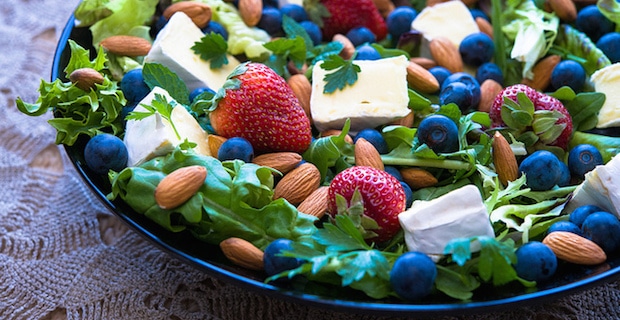
Nearly everyone knows that you need adequate amounts of vitamins on a daily basis in order to maintain optimal health, but many people are still unfamiliar with the functions each vitamin has in the human body. The following article will give you a general overview of the major roles each vitamin has in the human body and the best sources of food to obtain them from.
Vitamin A
Vitamin A (retinol) is a fat-soluble vitamin, which means that it’s stored in the liver and fatty tissues, and is eliminated from the body at a much slowly rate than water-soluble vitamins. Vitamin A is crucial for the health of your eyes and skin, and is involved in cell growth and reproduction. The best food sources of vitamin A are fish and liver. Beta-carotene, the precursor to vitamin A, can be found in high quantities in carrots and dark green vegetables.
Vitamin B1
Vitamin B1 (thiamine) is a water-soluble vitamin, which means that it isn’t readily stored in the body. Since water soluble vitamins are excreted from the body each day they must be taken in on a regular basis for optimal health. Thiamine’s main function in the body is to help metabolize carbohydrates into usable energy. The best food sources of thiamine are whole grains.
Vitamin B2
Vitamin B2 (riboflavin) is a water-soluble B vitamin, which is involved in vital metabolic processes in the body and is needed for normal cell function, growth, and energy production. The best sources of riboflavin are meats, fish, dairy products and eggs.
Vitamin B3 (Niacin, Niacinamide)
Vitamin B3 (niacin/niacinamide) is involved in the oxidation of fatty acids, energy production and tissue repair. The best food sources of niacin and niacinamide are meats, beans, whole grains and fish.
Vitamin B5
Vitamin B5 (pantothenic acid) is a water-soluble vitamin that is required for the metabolism of protein, carbohydrates and fats. The best food sources of pantothenic acid are meats, liver, kidney, fish, chicken, eggs and milk.
Vitamin B6
Vitamin B6 (pyroxidine) is essential for all stages of amino acid metabolism and is involved in the metabolism of carbohydrates and fats. Vitamin B6 is also plays a role in the synthesis of various neurotransmitters in the brain. The best food sources of vitamin B6 are wheat germ, chicken, fish and eggs.
Vitamin B7
Viatmin B7 (biotin) is involved the metabolism of fatty acids and branched-chain amino acids (BCAAs), and the growth and development of skin and hair. Biotin requirements are very small and it can be found in most foods, but some of the better sources are liver and egg yolk.
Vitamin B9
Vitamin B9 (folate/folic acid) is a water-soluble B vitamin that helps the body make healthy new cells, and also has a role in regulating blood flow in the body. Women take folate before and during pregnancy to help prevent birth defects. The best sources of folate are dark green leafy vegetables and legumes.
Vitamin B12
Vitamin B12 (cyanocobalamin) is a water-soluble vitamin that helps sustain healthy nerve cells and red blood cells. Vitamin B12 is also needed to make DNA, which is the genetic material that makes up all cells. The best food sources of vitamin B12 are liver, beef and fish.
Vitamin C
Vitamin C (ascorbic acid) is probably the most widely used water-soluble vitamin. Vitamin C plays a countless number of roles in the human body, but is best known for its antioxidant powers and positive effects on the immune system. The best food sources of vitamin C are red peppers, cherries, and a variety of citrus fruits.
Vitamin D
Vitamin D (cholecaliferol) is a fat-soluble vitamin and is essential for bone growth and mineral balance in the body. When ultraviolet rays from the sun hit your skin they trigger your body to synthesize vitamin D. Very few naturally-occurring foods contain high quantities of vitamin D, however, many foods are now fortified with it.
Vitamin E
Vitamin E (d-alpha-tocopherol) is a fat-soluble vitamin that is best known for its antioxidant properties. Although there are 8 different forms of vitamin E, the alpha-tocopherol form is the only one recognized to meet human needs. Some of the best food sources of vitamin E are wheat germ, almonds, sunflower seeds, hazelnuts and spinach.
Vitamin K
Vitamin K (phylloquinone) is a fat-soluble vitamin and is known as the blood clotting vitamin. If your body is deficient in vitamin K then it can’t effectively clot blood. The best food sources of vitamin K are cabbage, cauliflower, spinach and other dark green leafy vegetables.
Read more about dark green leafy vegetables
Whole Food Vitamins
Although you can take a multivitamin supplement each day and feel content that you’ve met your daily requirements, nothing can match the benefits of getting your vitamins from whole food. The vitamins found in natural foods are related to many other naturally occurring molecules that enhance their absorption and effects. When vitamins are isolated and used in supplemental form their absorption and physiological effects can be diminished. So, when choosing a multivitamin supplement go with one that uses whole food sources to ensure maximum absorption and benefits.
Image: Amazing Almonds










